
Tomb of the Roman Soldier
A historically intriguing tomb, once thought Roman but likely Nabataean, showcasing intricate architecture and burial practices.

Highlights
Must-see attractions
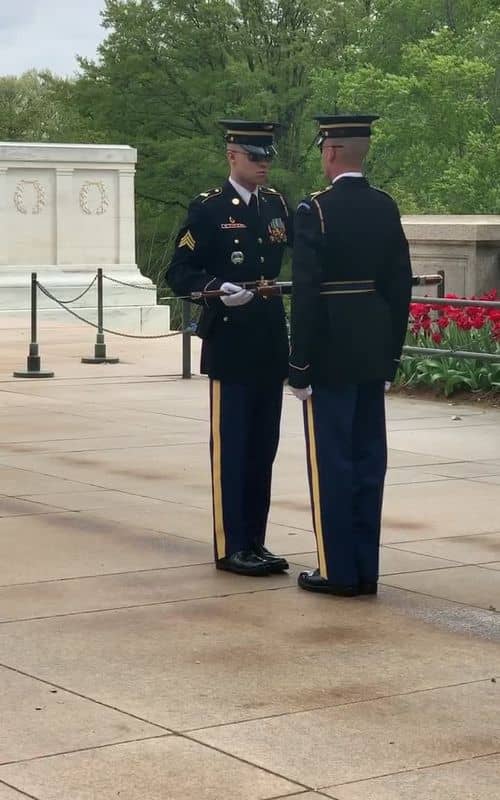
Social
From TikTok & Reddit
Best Time
Fewer crowds, softer light

Tomb of the Roman Soldier
Best Time
Fewer crowds, softer light

Highlights
Must-see attractions
A historically intriguing tomb, once thought Roman but likely Nabataean, showcasing intricate architecture and burial practices.
"Discover the 'Roman Soldier Tomb,' a misnomer revealing Nabataean grandeur and ancient burial rituals."

🚶♀️ Route Recommendation
Visit on the way down from the High Place of Sacrifice for a less crowded experience.
🧐 Name Misnomer Alert
It's likely Nabataean, not Roman! The armor was common for elites then.

Highlights
Discover the most iconic attractions and experiences

The Soldier's Facade
Lower Petra, near the High Place of Sacrifice
Engaged pilasters and columns frame three niches, the central one holding a figure in armor, giving the tomb its name.

Intricate Interior Niches
Inside the tomb
Discover large niches within the chamber and an additional room, hinting at the burial practices of the elite.
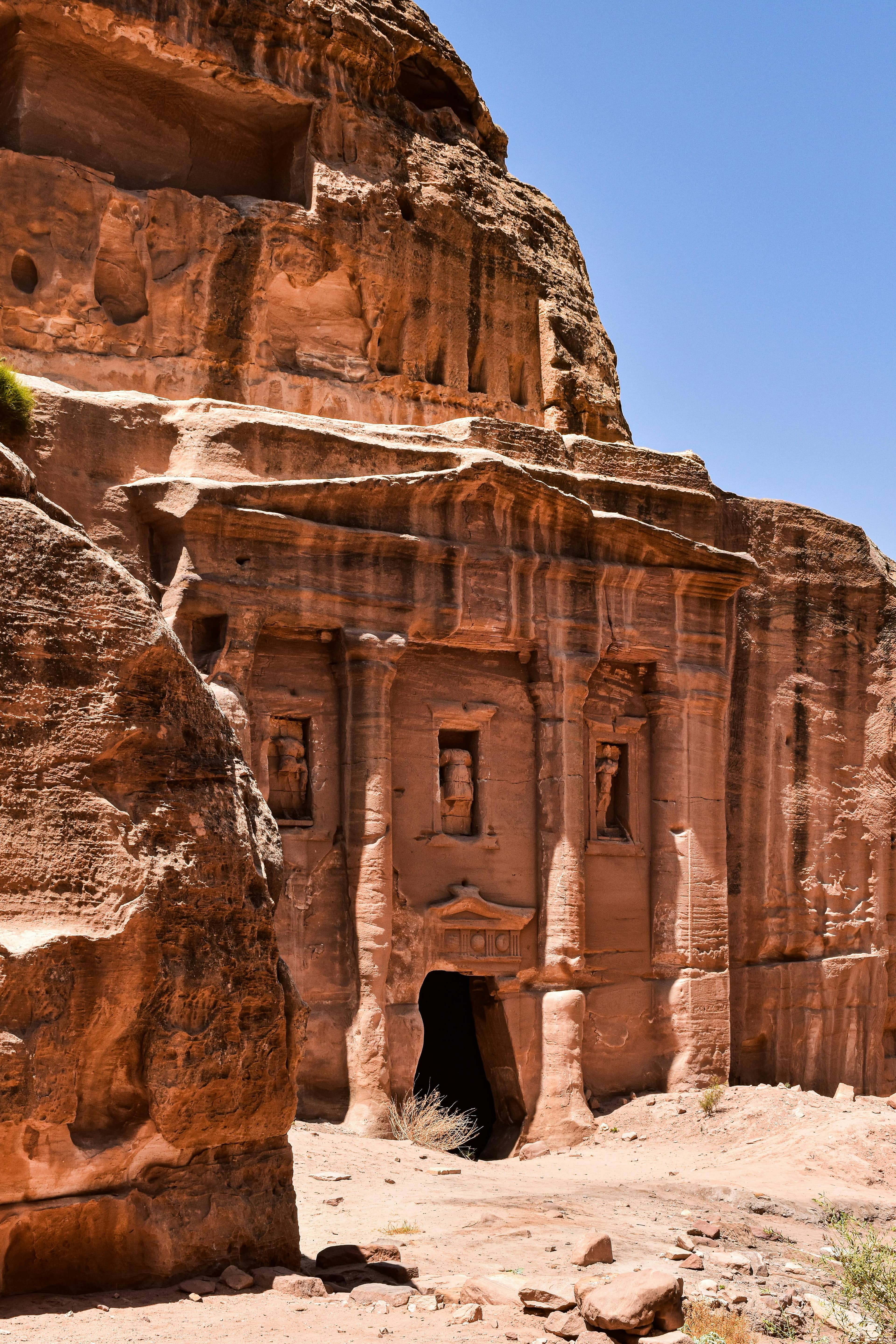
Remnants of Painted Stucco
Interior walls
Fragments of paintings on plaster reveal the tomb's original rich decoration, showcasing preserved colors.
Plans like a pro.
Thinks like you
Planning Your Visit
Timing Your Visit to Avoid Crowds
Understanding the Tomb's Name
Best Times
Insider Tips
from TikTok, Instagram & Reddit
🚶♀️ Route Recommendation
Visit on the way down from the High Place of Sacrifice for a less crowded experience.
🧐 Name Misnomer Alert
It's likely Nabataean, not Roman! The armor was common for elites then.
🎨 Look for Faded Colors
The tomb walls once had painted stucco; look closely for remnants of preserved colors.
Tips
from all over the internet
🚶♀️ Route Recommendation
Visit on the way down from the High Place of Sacrifice for a less crowded experience.
🧐 Name Misnomer Alert
It's likely Nabataean, not Roman! The armor was common for elites then.
🎨 Look for Faded Colors
The tomb walls once had painted stucco; look closely for remnants of preserved colors.
What Travellers Say
Reviews Summary
Visitors find the Tomb of the Roman Soldier to be an interesting stop, particularly for its historical context and architectural details, often visited on the way down from the High Place of Sacrifice. While not as grand as the Treasury, its facade and interior niches offer a glimpse into Nabataean burial practices and the misnomer of its name adds to its intrigue. Some find it less impressive than other Petra monuments.
"On the way down (or up depending on which direction you chose - I recommend on the way down as this is a less crowded route) from the high sacrifice place you will find the tomb of the Roman soldier. This is another great monument from the Petra valley!"
malik baudry
"The Soldier Tomb was part of a complex that included masonry built structures. The tomb was accessed via a large courtyard with porticoes. The Colored Triclinium faced directly opposite the entrance of the tomb, and there were two-story buildings flanking both rock-hewn structures.
Its exterior facade is decorated with engaged pilasters and columns that frame three niches. The central niche holds the statue of a military officer in armor giving thus its name to the tomb. The interior chamber has several large niches as well as an extra room.
Excavations have revealed that the courtyard was built during the Nabatean period about the second half of the 1st century AD. Therefore, the military officer statue is most likely a Nabatean nobleman or king rather than a Roman. The name Roman Soldier Tomb for this structure is therefore a misnomer."
Jesús D
"Not one of the most impressive."
Paul Ciprian
What People Like
What People Dislike
Frequently Asked Questions
🚇 🗺️ Getting There
The Tomb of the Roman Soldier is located in the lower part of Petra, often visited on the descent from the High Place of Sacrifice. You'll need to enter Petra through the main visitor center and follow the trails. It's a significant walk, so wear comfortable shoes!
It's accessible via established trails within Petra. The path is generally well-maintained, but it involves walking and some uneven terrain. Consider it part of the overall Petra hiking experience.
Using a map of Petra is highly recommended. The Tomb of the Roman Soldier is often marked, especially if you're following routes from popular viewpoints like the High Place of Sacrifice.
There is no public transport within Petra itself. You'll be walking or can opt for a donkey or camel ride in certain areas, but the tomb is best reached on foot to appreciate the surroundings.
No, it's part of the main Petra archaeological site. You enter Petra through the main visitor center and follow the designated paths to reach the tomb.
🎫 🎫 Tickets & Entry
No, the Tomb of the Roman Soldier is within the Petra archaeological park. Your general Petra entrance ticket covers access to all its monuments, including this tomb.
Petra typically opens early and closes in the late afternoon. It's best to check the official Petra Development and Tourism Region Authority (PDTRA) website for the most current hours, as they can vary seasonally.
Ticket prices for Petra vary for international tourists, Jordanians, and residents. A one-day pass for international visitors is usually around 50 Jordanian Dinars. Check official sources for the latest pricing.
Yes, purchasing Petra tickets online in advance is often recommended to save time and ensure entry, especially during peak seasons.
Standard Petra rules apply. Respect the historical site, do not climb on structures, and take all your trash with you. The tomb itself is an archaeological site, so treat it with care.
🎫 🏛️ Onsite Experience
While named after a Roman soldier, excavations suggest it was built in the 3rd quarter of the 1st century AD, predating Roman annexation. The central figure's armor was common among Nabataean elites, possibly indicating it's a tomb for a Nabataean nobleman or king.
Inside, you'll find large niches and an additional room. Look closely at the walls for remnants of painted stucco, which indicate the tomb was once richly decorated.
It's less grand than the Treasury but offers a unique glimpse into Nabataean burial complexes and architectural styles. Its significance lies in its historical context and intricate details.
Allow about 15-30 minutes to explore the tomb and its surroundings, depending on your interest in its history and architecture. It's often visited as part of a larger exploration of Petra.
Many guided tours of Petra include this tomb, especially those that cover the route from the High Place of Sacrifice. It's a good way to learn about its history from an expert.
📸 📸 Photography
Late afternoon offers softer light that can highlight the textures of the rock and any remaining colors. Early morning can also provide beautiful, less harsh lighting.
Tripods are generally allowed in Petra, but it's always best to check the latest regulations at the visitor center. Be mindful of other visitors when setting up.
Focus on the facade details, the niches inside, and any visible remnants of painted stucco. Wide shots showing its context within the Petra landscape are also effective.
Yes, photography is generally permitted inside the tomb, but avoid using flash as it can damage delicate ancient materials and disturb other visitors.
Experiment with angles from the courtyard looking towards the facade, and from inside looking out. Capturing the scale of the niches is also a good photographic goal.
For Different Travelers
Tailored advice for your travel style
👨👩👧 Families with Kids
Practical Tip: Ensure children have plenty of water and snacks, as the walk can be long. The tomb's interior niches can be a point of interest, and discussing the 'mystery' of its name can spark their imagination. It's a good stop to break up the longer hikes and appreciate the scale of Nabataean architecture.
🚶♀️ Budget Travelers
Tip: To maximize your visit and avoid the 50 JOD tourist fee for multiple entries, plan to spend a full day exploring Petra. This tomb is one of many incredible sites you can see with a single ticket. Consider packing your own food and water to save money on site.
Deep Dives
In-depth insights and expert knowledge
The Misnomer: Roman Soldier or Nabataean Noble?
Coins depicting King Aretas IV, who reigned during that period, show similar armor styles. This strongly suggests that the figure is not a Roman soldier but rather a Nabataean nobleman or king, a respected deceased individual buried with the status symbols of his time. The tomb, along with its associated courtyard and flanking buildings, showcases the prosperity and advanced architectural capabilities of the Nabataeans, blending their traditional rock-cut techniques with influences from Hellenistic and Roman Mediterranean palatial buildings.
The complex served multiple purposes, potentially combining the cult of the dead with spaces for everyday life or special occasions. The burial chamber itself is a significant rock-cut structure, once covered with painted stucco, highlighting the rich decoration that adorned these elite tombs. Understanding this context transforms the tomb from a simple monument to a window into Nabataean society and their sophisticated artistry.
Architectural Features and Burial Practices
Internally, the tomb features several large niches and an additional room, providing insight into Nabataean burial customs. The main burial chamber is a substantial space, with a deep loculus (shaft or urn tomb) high in the back wall, likely for the most important deceased. Other burial features, such as arcosolia (vaulted niches with floor recesses for bodies), are also present on the walls. The presence of these varied burial types suggests that the tomb may have been used for multiple family members or individuals over time.
Fragments of painted stucco found on the walls and floor indicate that the interior was richly decorated, with patterns mimicking cut stone and other materials. It's believed the facades may have also been covered in stucco and painted. The complex's design, combining rock-cut Nabataean elements with brick architecture, reflects a clear inspiration from the palatial buildings of the Hellenistic and Roman Mediterranean, showcasing a sophisticated blend of cultural influences.
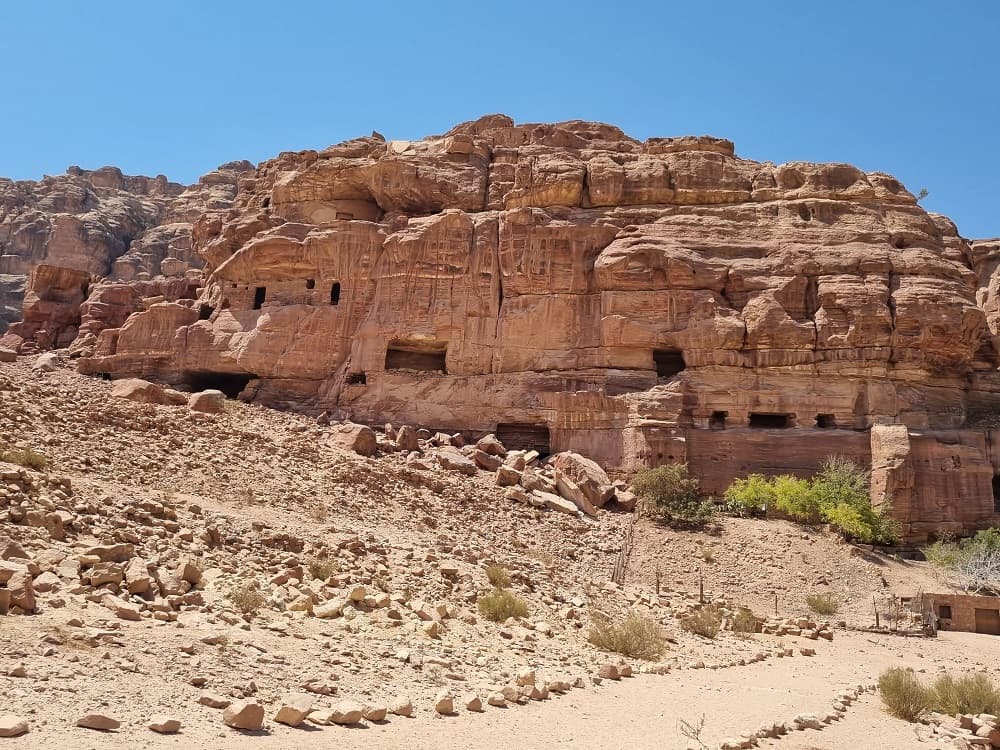
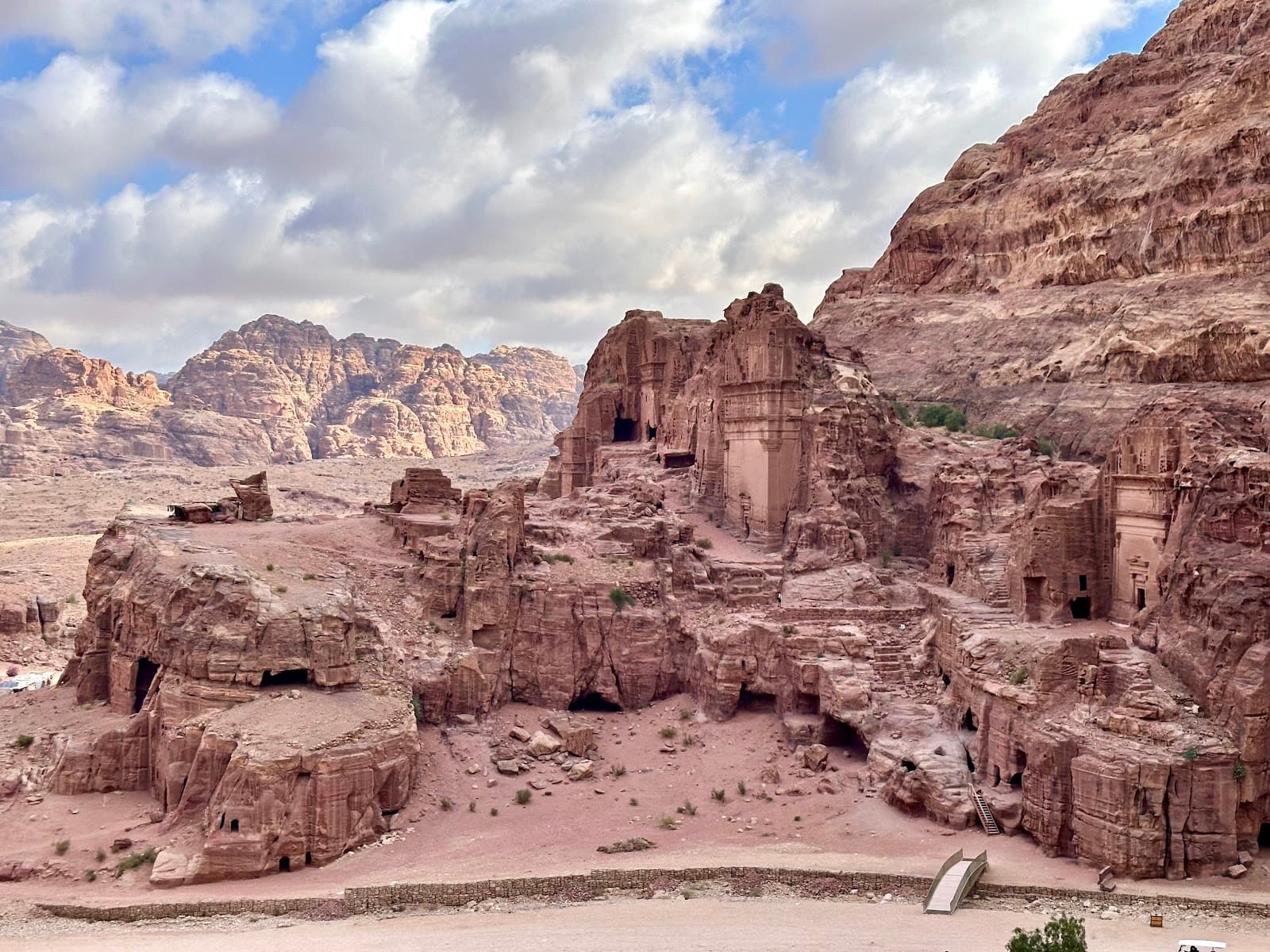

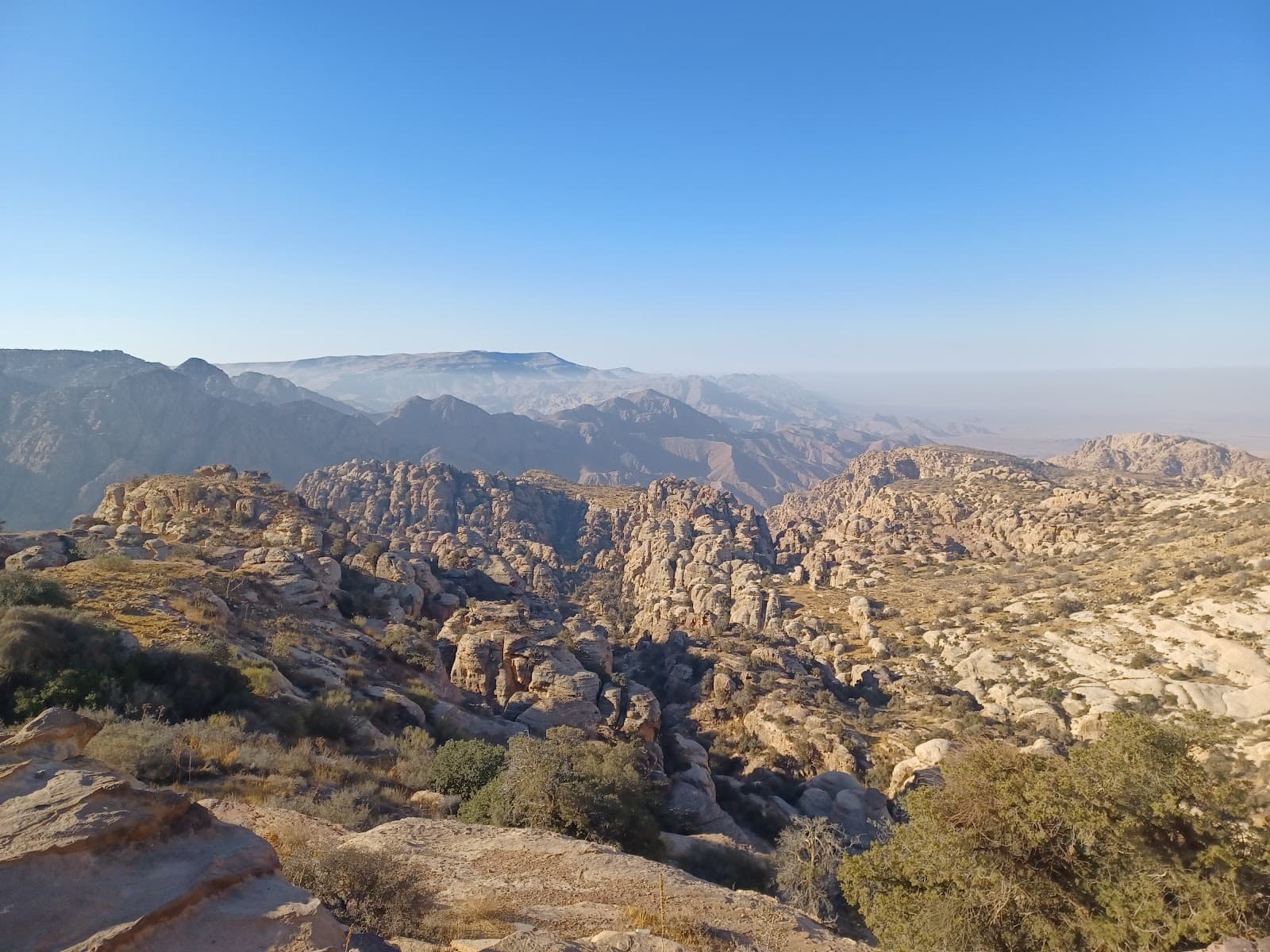


Social
from TikTok, Instagram & Reddit